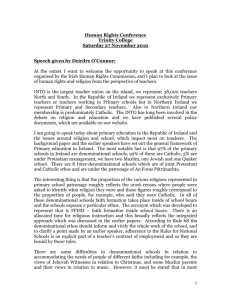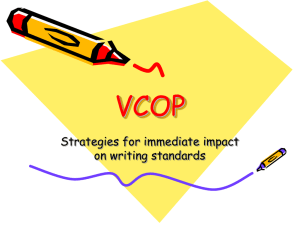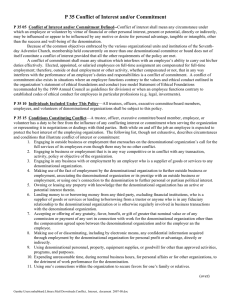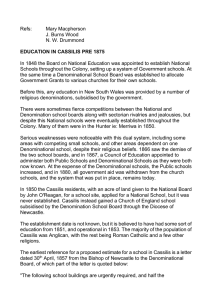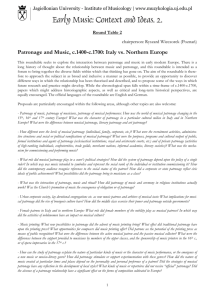“Towards a Solution to Ireland`s School Patronage Problem”
advertisement
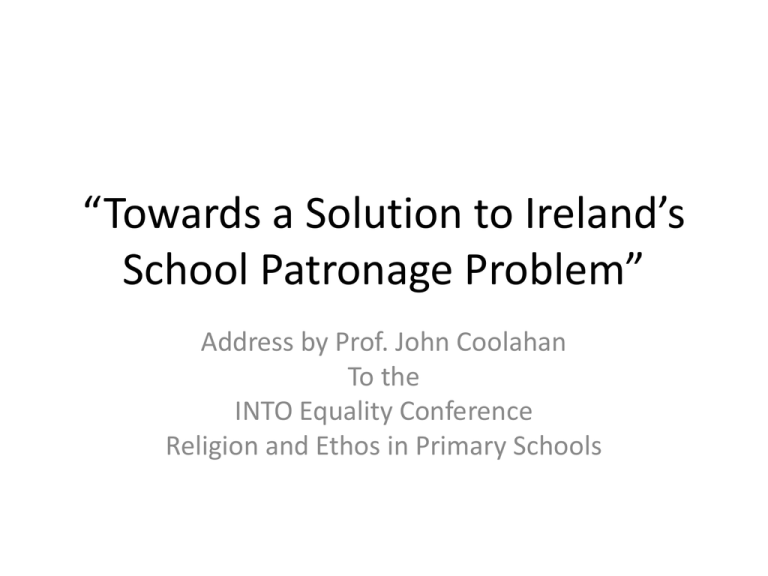
“Towards a Solution to Ireland’s School Patronage Problem” Address by Prof. John Coolahan To the INTO Equality Conference Religion and Ethos in Primary Schools School Patronage A Problem Requiring a Solution Pattern of School Patronage – A Significant and Neglected Problem 96% Denominational Control and Ethos 20% of Schools have less than 50 pupils – with average of 156 pupils, Ireland has smallest average school size – large no. of Schools per capita. Since 1970s Minority of Parents seek change “Educate Together” Public Recognition of the Problem Varied Views on Solution. National Education Convention (1993-94) “The main issue here is that, in many cases, parents not only do not want their children to attend religious instruction classes, but they also object to their children being educated within schools whose dominant ethos is not of their faith/beliefs”. As a way forward, the Secretariat stated, “The dilemma and challenge posed for policy makers and school authorities require not only dialogue at the school level but the development of “good practice” guidelines by a suitably qualified and representative working group convened by the Department. Such a working party might also explore legal and, perhaps, constitutional issues that may be involved.” White Paper (1995). “Such a working party will be convened in the near future.” Constitution Review Group 1996 “In summary, therefore, the present reality of the denominational character of the school system does not accord with Article 42.2.4. The situation is clearly unsatisfactory. Either Article 44.2.4 should be changed or the school system must change to accommodate the requirements of Article 44.2.4” (Constitution Review Group Report, 1996). Education Act, 1998 Section 14(4); Section 16(1) confirm powers of school patrons. Section 15 specifies the responsibility of Boards of Management to the patron. Ireland in 21st Century • Increasingly multi-racial, multi-lingual, multiethnic, multi-religious • Demographic, social, cultural, economic change • Changes in Religious practice / observance, attitudes • Growth in secularism. • 2002 INTO Annual Conference – Recognition of the need to care for diversity of religious education. • Call for a Forum which “would initiate a reflective process involving all the partners in education in order to find accommodation and inclusiveness.” Perspectives of International Agencies e.g. Council of Europe (2006) Ireland “to pursue on-going efforts to accommodate growing diversity in Irish schools, including in terms of the demand for non-denominational or multi-denominational schools” ICCPR (2008) criticises impact of “religious integrated curriculum” etc. March (2011) “The Committee reiterates its previous concluding observations and recommends that the State party accelerates its efforts to establish alternative non-denominational or multidenominational schools and to amend the existing legislation that inhibits students from enrolling in a school because of their faith or belief” (UNCERD) The Changing Policy Context 2008 Community National Schools (Pilots) 2008 DES – Conference “The Governance Challenge for future primary school needs” Most Rev. Dr. Martin “I believe that ways can be found to expand the role of other patronage models, where such demands exists, through a form of structured divestment by the Catholic patron, which recognises the rights and interests of all parties. It would flow, as I see it, from a gradual movement of children and teachers towards differing schools in an area, each of which would evolve towards the ethos of a particular patron.” Feb 2011 Commission on School Accommodation, urged “a greater diversity of patronage through maximising the use of existing infrastructure.” May 2011 IHRC – Report “The overarching recommendation of the IHRC is that the State should ensure that there is a diversity of provision of school type within educational catchment areas throughout the State which reflects the diversity of religious and non-religious convictions now represented in the State.” A Legal and Moral Obligation to Seek a Solution. Programme for Government (2011 Forum, White Paper etc. • Policy – Operate within existing Constitutional and Legal Provisions • T.O.Rs - Recommend Adaptations to Existing System • Means – Consultative, Voluntary Processes - Avoiding Social Conflict. Forum Dateline April 2011 Launch of Forum on Patronage and Pluralism in the Primary Sector June 2011 Plenary Discussion Days Nov 17 Plenary Briefing Day Feb. 1, 2012 Report Submitted June 2012 Government Decisions Towards a Solution 3 Categories of Areas 1 – Diversity in areas of rising population 2 – Areas of stable population, but parental demand for alternative patronage 3 – ‘Stand Alone Schools’, where pupil body involves a number of faiths or none. Category 2 – Divestment of Patronage Phase One – 43 areas selected by DES Views of Parents of Pre-school and School Pupils Where demand exists, patron explores and presents options DES evaluates Views of School Establishment Group Minister decides Dec. 2012 5 Pilot Surveys Jan – 8 Feb. 2012 38 Surveys Work in Progress. Areas of Concern • Protect Social Inclusion and Special Needs in Diversification • Value of Proposed Enrolment Policy • Overview by Inspectorate • Children’s Best Interests – Central in Transfer Arrangements • Regard for Teachers’ Rights and Viewpoints • Positive Role for BOM’s, Principals and Support Agencies • Patron’s Responsibility. Category 3 – Schools with Mixed Pupil Intake, esp. S.A.Ss. • Forum Proposed a DES Protocol to help schools become more inclusive • Detailed suggestions for Proposed Protocol • Govt. to seek pupil consultations on suggestions • Govt. to prepare a White Paper in 2013. Recommendations for Exclusively Denominational Schools • Denominational R.E. / Formation Guaranteed • Time for Sacramental Preparation to form part of the 2½ hrs p.w. for R.E. – not to intrude on Time Allotted to General Curriculum. • ERB for all Pupils. Recommendations for Denominational Schools, with a Minority of Pupils with other Belief Systems (esp. S.A.S.s) • • • • • • • • • • • Denominational R.E. for Majority Guaranteed ERB and Ethics for all Pupils DES Protocol to Guide Schools regarding the rights of the Minority Practical Applications of Protocol in School Plan – Flexible School Policy to form part of SSE and WSE Ethos Guidelines to be Issued to Schools Revision of Rules for National Schools (esp. No. 68) Restating of “Integrated Curriculum” Guidelines Guidance for Schools on Pupil “Opt-Out” Process Sensitivity for Religious Celebrations of all Pupils Display of Religious Artefacts Balanced – Reflective of Pupils’ Beliefs. Shape of the Possible Solution • Diversity in Provision of New Schools • Purely Denominational Schools (Varied) • Denominational Schools with Minority of other Belief Systems (incl. SASs) • Educate Together Schools (multi-denominational) with ERB, Ethics • Community National Schools (multi-denominational) with ERB, Ethics • Non-Denominational Schools (now possible) with ERB, Ethics Irish Community Seeking to Respond to the Ed. Needs and Rights of its Diverse Citizenry. Work in Progress – A Contemporary Challenge to Civic Responsibility.
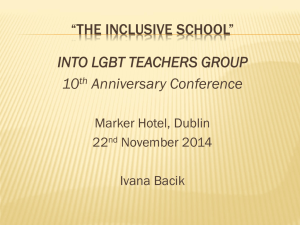
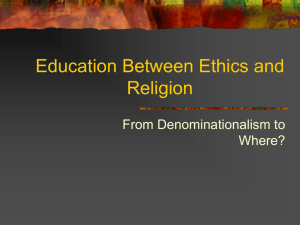

![afl_mat[1]](http://s2.studylib.net/store/data/005387843_1-8371eaaba182de7da429cb4369cd28fc-300x300.png)
